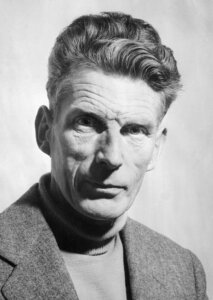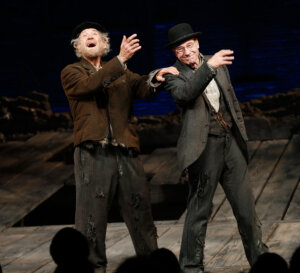Marty Rea and Aaron Monaghan in a 2018 production of ‘Waiting For Godot.’ Photo by Getty Images
When an obscure Irish writer living in Paris completed the draft of a play on Jan. 29, 1949, it was, he later remarked, little more than a “diversion” from the trilogy of novels on which he had been laboring. For a moment, he considered naming the play, which he had written in French, Waiting. But for once deciding that more, rather than less, was more, the author added a third word to the title: Waiting for Godot.
This year marks the 75th anniversary of the birth of the work the world of theater had been waiting for: Samuel Beckett’s Waiting for Godot. First performed in Paris in 1953, the two-act play with two bowler-hatted and red-nosed characters, Vladimir and Estragon, spurred one critic, the playwright Jean Anouilh, to declare it “a masterpiece that will cause despair for men in general and for playwrights in particular.” Two years later at the play’s opening in London, the critic Kenneth Tynan grasped Beckett’s haunting joke: “Passing the time in the dark is not only what drama is about, but also what life is about.”
Yet it was another critic, Vivian Mercier, who best summed up Beckett’s accomplishment: It’s a “play in which nothing happens, twice.”
Nothing happens from start to finish, from the moment when Estragon, pulling futilely at his boot, laments there is “Nothing to be done,” to the moment Estragon and Vladimir announce they are going, but don’t. In between, the characters concoct conversations, or what they call cantering, to pass their time on a barren patch of land and formless mound while they wait, and wait some more, for someone they have never met named Godot.
While Godot’s appearance never happens — to keep others waiting is often a sign of power — other stuff sort of happens. A second couple — the pompous Pozzo and his burdened slave Lucky — shows up in both acts (though with their positions reversed), and a withered tree sprouts a few leaves between the acts. But strictly speaking, behind the characters’ antic actions and spoken words — often in a halting trickle, sometimes in an incoherent cascade — nothing happens. The play, and presumably our lives, begins and ends in ignorance and impotence. In between those events, we do what we do best as a species: We wait “astride of a grave and a difficult birth” for nothing to happen.

Beckett had little patience with critics, even less with academics on the meaning of his writings. (At the climax to a hilarious exchange of insults with Vladimir, which includes “morpion” and “sewer rat,” Gogo exclaims “Crritic!”) When the American director Alan Schneider asked Beckett who or what Godot means, the author snapped, “If I knew, I would have said so in the play.” He wanted nothing to do with the efforts to decipher the meaning of nothing, and he shrugged off attempts to interpret the shrugs of his clowns. “I’d be quite incapable,” he insisted, “of writing a critical introduction to my own works.”
Such disclaimers, as Beckett well knew, served only to spark yet more dissertations on the play’s meaning. Perhaps the most sure-footed approach is historical and biographical. With Nazi Germany’s invasion and occupation of France in 1940, Beckett found himself in an enviable position; as the citizen of a neutral country, he enjoyed a kind of legal impunity, if not immunity, in a city now swathed with swastikas.
Yet it was never simple for Beckett. Once the Nazi and French police began to arrest Jewish friends, Beckett later recalled, he could no longer stand around “with my arms folded.” (In an early draft of the play, Vladimir, who recalls, in an echo of Vichy’s antisemitic legislation, that he was not allowed to enter the Eiffel Tower, was named “Lévy.”)
In 1941, Beckett joined a resistance group — taping a huge bullseye to his back by taking the code name “L’Irlandais” — and translated reports on German troop activities. When the group was smoked out by the SS, Beckett fled south, often sleeping on barren country roads resembling the one in the play, before reaching the town of Roussillon, where he spent the rest of the war waiting for it to end.
But the play’s denuded stage also helps to explain the play’s universal appeal. (Though perhaps not at first in Coral Gables, Florida, where the audience for the American premiere in 1956 — advertised as the “laugh hit of two continents” — walked out in a huff long before the end of the first act.)
It has been performed on the stages not only of the world’s best-known theater companies, but also in American jails — there was the now-famous production in 1957 at San Quentin Penitentiary — and a decade later in apartheid South Africa, directed by the playwright Athol Fugard. Slightly more than two decades later, in after that, Susan Sontag courageously staged a performance — conditions allowed only for the first act — in a battered and besieged Sarajevo.

Scarcely two years after the Paris opening, the tramps in Waiting for Godot found a home in Israel, where the play premiered in Tel Aviv in 1955. Over the decades, dozens of productions have appeared, reflecting the ways in which everything and nothing has changed in Israel. As the theater scholar Shimon Levy notes, “the elusive Godot hovers as a black aura over all the Israeli — or any other — stages on which the play is performed.”
From the critical hostility to the early productions — Israeli pioneers had no need for the intellectual decadence of Paris — the play morphed into Ilan Ronen’s daring experiment in 1984, casting Didi and Gogo as Palestinian day workers in Israel, while Pozzo became an Israeli master lording it over an Arabic-speaking Lucky. Makram Khouri, the Arab-Israeli actor who starred in the play, explained that when Gogo and Dido decide to go, but remain in place, it is because, like Khoury, they have nowhere else to go. In the four decades since that production, nothing has changed while everyone still waits.
Mercier’s neat quip about Godot — that it’s a “play in which nothing happens, twice” — captures the tragedy of the Israeli-Palestinian relationship: Nothing happens, but not twice or even thrice, but countless times since 1948. Neither Israelis nor Palestinians have anywhere else to go. The awful reality never changes over the years, while the scenery has. When time enough has passed from the current horrors, how will a director set the play? As a tunnel rather than a road, with an airshaft replacing the tree? Or a pile of concrete rubble for a mound, with shattered corpses and not sleeping tramps stretched along what had once been a road?
Of course, it is too early to know. But it is not too early to recall the lines spoken by Didi near the play’s end: “Was I sleeping, while others suffered? Am I sleeping now? Tomorrow, when I wake, or think I do, what shall I say of today?”

I hope you appreciated this article. Before you go, I’d like to ask you to please support the Forward’s award-winning journalism this Passover.
In this age of misinformation, our work is needed like never before. We report on the news that matters most to American Jews, driven by truth, not ideology.
At a time when newsrooms are closing or cutting back, the Forward has removed its paywall. That means for the first time in our 126-year history, Forward journalism is free to everyone, everywhere. With an ongoing war, rising antisemitism, and a flood of disinformation that may affect the upcoming election, we believe that free and open access to Jewish journalism is imperative.
Readers like you make it all possible. Right now, we’re in the middle of our Passover Pledge Drive and we need 500 people to step up and make a gift to sustain our trustworthy, independent journalism.
Make a gift of any size and become a Forward member today. You’ll support our mission to tell the American Jewish story fully and fairly.
— Rachel Fishman Feddersen, Publisher and CEO
Join our mission to tell the Jewish story fully and fairly.
Our Goal: 500 gifts during our Passover Pledge Drive!
















